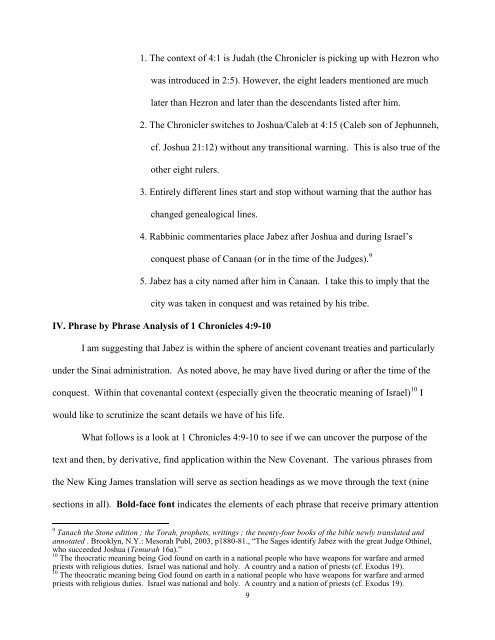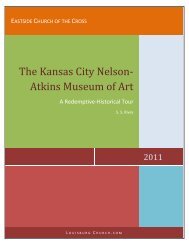Exegesis of 1 Chronicles 4:9-10 The
Exegesis of 1 Chronicles 4:9-10 The
Exegesis of 1 Chronicles 4:9-10 The
You also want an ePaper? Increase the reach of your titles
YUMPU automatically turns print PDFs into web optimized ePapers that Google loves.
1. <strong>The</strong> context <strong>of</strong> 4:1 is Judah (the Chronicler is picking up with Hezron who<br />
was introduced in 2:5). However, the eight leaders mentioned are much<br />
later than Hezron and later than the descendants listed after him.<br />
2. <strong>The</strong> Chronicler switches to Joshua/Caleb at 4:15 (Caleb son <strong>of</strong> Jephunneh,<br />
cf. Joshua 21:12) without any transitional warning. This is also true <strong>of</strong> the<br />
other eight rulers.<br />
3. Entirely different lines start and stop without warning that the author has<br />
changed genealogical lines.<br />
4. Rabbinic commentaries place Jabez after Joshua and during Israel‘s<br />
conquest phase <strong>of</strong> Canaan (or in the time <strong>of</strong> the Judges). 9<br />
5. Jabez has a city named after him in Canaan. I take this to imply that the<br />
city was taken in conquest and was retained by his tribe.<br />
IV. Phrase by Phrase Analysis <strong>of</strong> 1 <strong>Chronicles</strong> 4:9-<strong>10</strong><br />
I am suggesting that Jabez is within the sphere <strong>of</strong> ancient covenant treaties and particularly<br />
under the Sinai administration. As noted above, he may have lived during or after the time <strong>of</strong> the<br />
conquest. Within that covenantal context (especially given the theocratic meaning <strong>of</strong> Israel) <strong>10</strong> I<br />
would like to scrutinize the scant details we have <strong>of</strong> his life.<br />
What follows is a look at 1 <strong>Chronicles</strong> 4:9-<strong>10</strong> to see if we can uncover the purpose <strong>of</strong> the<br />
text and then, by derivative, find application within the New Covenant. <strong>The</strong> various phrases from<br />
the New King James translation will serve as section headings as we move through the text (nine<br />
sections in all). Bold-face font indicates the elements <strong>of</strong> each phrase that receive primary attention<br />
9 Tanach the Stone edition ; the Torah, prophets, writings ; the twenty-four books <strong>of</strong> the bible newly translated and<br />
annotated . Brooklyn, N.Y.: Mesorah Publ, 2003, p1880-81., ―<strong>The</strong> Sages identify Jabez with the great Judge Othinel,<br />
who succeeded Joshua (Temurah 16a).‖<br />
<strong>10</strong> <strong>The</strong> theocratic meaning being God found on earth in a national people who have weapons for warfare and armed<br />
priests with religious duties. Israel was national and holy. A country and a nation <strong>of</strong> priests (cf. Exodus 19).<br />
<strong>10</strong> <strong>The</strong> theocratic meaning being God found on earth in a national people who have weapons for warfare and armed<br />
priests with religious duties. Israel was national and holy. A country and a nation <strong>of</strong> priests (cf. Exodus 19).<br />
9



